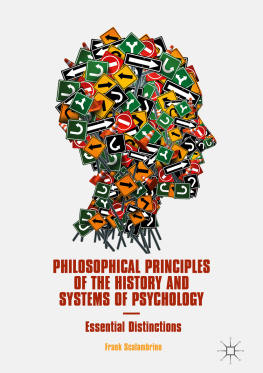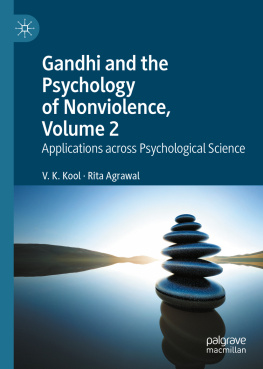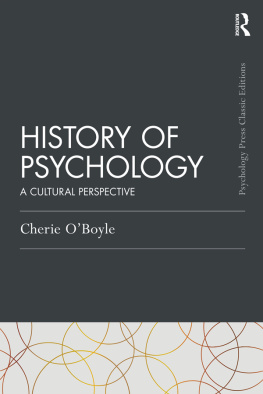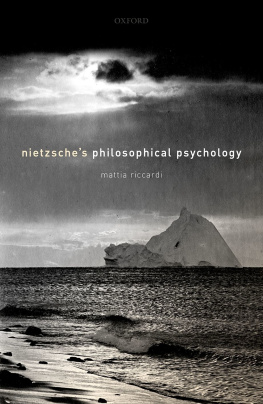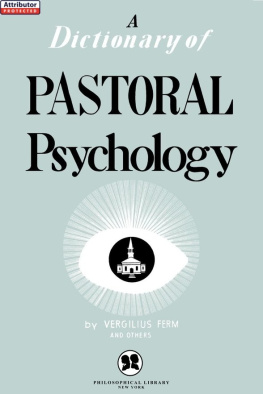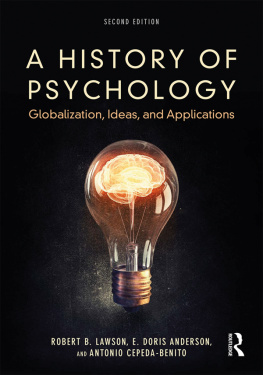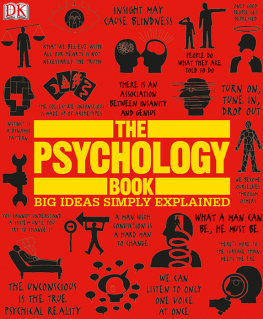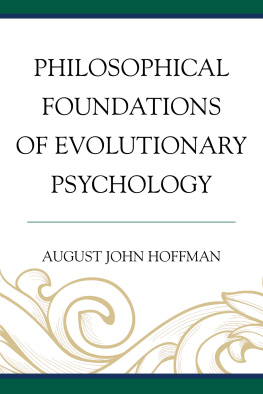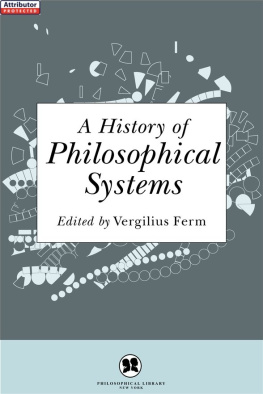1. Introduction: The Project of the Philosophical Archeology of the History and Systems of Psychology
The intention of this project is to furnish us with a principled systematic understanding of essential distinctions with which to think through the history of Western psychology. Throughout the course of this book terms such as principle, system, history, and even psychology will be further clarified. The following terms have been selected for clarification in the introduction because they will be essential and fundamental in clarifying terms later in the book. Moreover, it is important to keep in mind that the material with which we are dealing is history , that is, the history of Western psychology. Thus, we will begin by taking into consideration the principles of historiographythe study of the writing of history; the principles according to which historians inscribe events from the past into historical narratives.
Ultimately, a system dealing with history, especially in the light of historiography, must be philosophical. This is the case because there is too much disagreement as to what psychology refers toespecially when considered across the history of Western psychology. In other words, when different participants in the history of a discipline disagree regarding the very elements of what constitutes participation in that discipline, then there is too much essential disagreement, that is, disagreement about the essence of the discipline, to suggest there is an essential systematic order to the elements constituting the discipline. Rather, what is needed is an explication of the choices being made by participants in the history of such a discipline.
Just as a discipline can tolerate a plurality of choices constituting its practice, the distinctions regarding which such choices are being made may be understood as constituting a systematic understanding of that discipline in general. For example, throughout the history of psychology, including today, we find essential disagreement as to what psychology is even supposed to be the study of; is psychology the study of biology, spirituality, behavior, mind, unconscious drives and motives, or the use of freedom? Though it may be tempting to say all the above, some understandings, as the history of psychology illustrates for us, of what constitutes the elements of psychology are essentially distinct from other understandingswe will clarify this later in the book in terms of incommensurability.
Thus, choicesand commitment to those choicesconstitute the activities of the discipline of psychology from out of the potential ways psychology can be practiced, and the best indicator of how psychology can be practiced is how psychology has been practiced, that is, its history. What is more, the choices and commitments which constitute the discipline of psychology are made from within a system of distinctions. Now, though it may not be possible to reveal or explicate the entire system of such distinctions, it is possible to become more or less familiar with it. Therefore, (stated in the other direction) by increasing our familiarity with the system of essential distinctions from which choices and commitments constitute the activities of psychology, we increase our ability to think through the activities of contemporary psychology and the history of Western psychology.
1.1 What Is History?
In regard to the study of history, there are several standard distinctions which are essential for our understanding of the history of psychology. We will discuss the following distinctions: (a) distinct understandings of History, that is, History v. the Past, (b) Original v. Reflective v. Philosophic History, and (c) Understandings of the Past: Cyclical v. Linear v. Chaos, (d) distinct understandings of Historiography, that is Presentism v. Historicism , (e) Western Historical Periodization, (f) Sacred v. Profane History, (g) Internal v. External History, (h) Primary v. Secondary Sources, (i) Witting v. Unwitting Testimony, (j) Salient v. Deterministic Selection, (k) Author Intent v. Reader Utility.
(a) History refers to the re-presentation of the past, or, as historians like to say, History refers to what historians do. The Past, then, is supposed to refer to everything that has already happened. This initial distinction points to the importance of historiography, that is, the writing or activity of constructing the narratives which constitute history. (b) G.W.F. Hegel (17701831), in his Philosophy of History , provided the following distinctions. Original History refers to simply recording events from the past; the best practice of which being the annals of history or recordings of events as they transpire. Reflective History refers to re-presenting history with importance placed more on the Present time in which the history is being re-presented than on when the events occurred. Hegel divided Reflective History into Universal, Pragmatic, and Critical history.
Whereas Universal History aims to re-present an entire history of, for example, some movement, culture, people, or nation, Pragmatic History re-presents historical events as if they were presently happening, that is, making them Virtually Present. Hegel characterized Critical History as a History of History, that is, a criticism of historical narratives and an investigation of their truth and credibility (Hegel : 50). Finally, Philosophic History refers to the thoughtful consideration of history. In other words, according to Hegel. , when historians seek to identify the presence of universal laws to which historical narratives may be subordinated, then the resulting narrative may be called philosophic. Thus, philosophic history may be understood as the decoding of original and universal history to identify the presence and development of various socio-cultural and economic evolutions, which original and universal histories leave concealed.
(c) Our initial distinction between history and the past, should cast the clich history repeats itself, in a more complicated light. That is to say, we are not as concerned with the habitual tendencies of historiographers as we are with witnessing patterns repeating throughout the past. Thus, the past may be characterized according to different principles. Understanding the past as Cyclical when writing historical narratives, especially reflective and philosophic narratives, means that patterns discernible in the past may be found endlessly repeating across histories. In the West the Cyclical understanding of the past is often associated with ancient Greek cosmological thinking and historians who limit the influence of technology to change our cycle, while also discerning endless repetition given the potentials of universal human nature (cf. Deleuze ). A Linear understanding of the past provides a different principle for historical narratives. If the past has a linear character to it, then it is headed toward some culmination. When traversing the line is thought to provide a culmination better than the lines point of departure, then the linear historical narratives are construed as Progressive, and when the line is conversely understood, then they are considered Regressive.
It is important to note, a number of historians and philosophers of history articulate their historical understanding of our own presence in history as at the conclusion of a Progressive Linear understanding of the past, for example Francis Fukuyama (1952) and Jean Baudrillard (19292007). Thus, Fukuyama speaks of the end of history as the end of the idea of historical progress (1992). Similarly, Baudrillard saw Progressive Linear understandings of the past as utopian-based, and with the failure of economies and politics to accomplish such a utopia has come the collapse of the idea of progression toward such a goal; for example, Baudrillard points to several moments in history each of which he declares to be the illusion of the end, such as the World Wars, the Cold War, and Y2K ().

